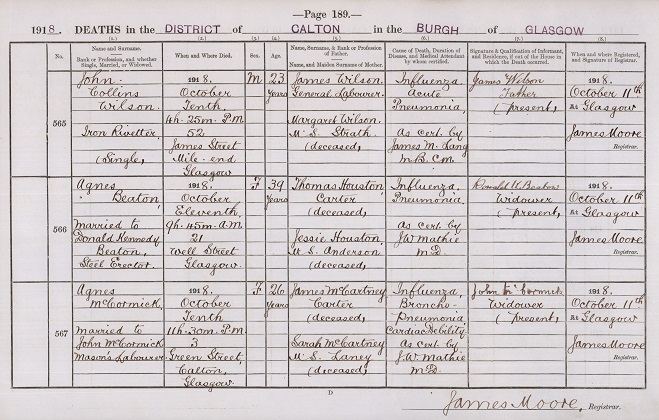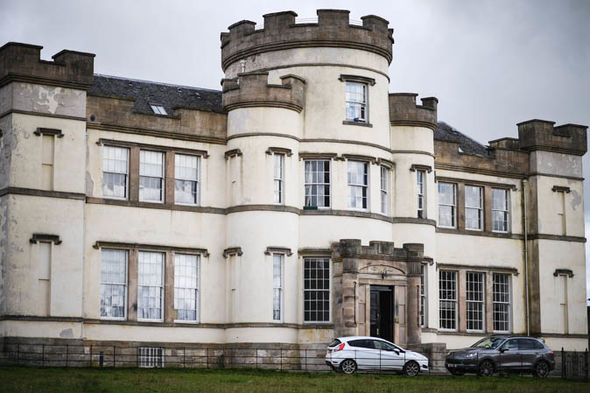The Flu Pandemic of 1918 In ScotlandAs the world is currently experiencing a serious pandemic the likes of which humans haven't seen for one hundred years I thought I'd do a bit of research on how the 1918 epidemic was experienced in Scotland. This journal article (Scottish 'Flu: The Scottish Experience of 'Spanish Flu' by Niall P. A. S. Johnson) laments the fact that Scotland is one of several areas of the world that has been sadly lacking in terms of statistics and data. This is not to imply that there is NO information. There are some details about the three waves of the infections and the importance of cities that were ports. And that young adults were the most affected. All this tends to correlate with the general information we have about the effects of the disease. Johnson goes into details about the lack of sufficient data for death among pregnant women. He feels that these were under reported. Reading the article it appears all the data is under reported. The paper "Exploring Scotland’s influenza pandemic of 1918–19: lest we forget" by AR Butler, and JL Hogg comes to very similar conclusions: "The number dying in Scotland of flu was originally given as 17,515 in just ten months, based on the figures given in the statistical returns, but this is certainly a substantial underestimate. The Registrar General of Scotland reassessed the figure in a supplementary report and concluded that, during the pandemic, 22,000 deaths could be attributed to influenza and, if that figure is further adjusted in the same way as that for global mortality, then around 70,000 is not unreasonable. Many, of course, who contracted influenza recovered (nine out of ten) and so the number of Scots infected with flu was nearly one million. There must have been few families in the land who were not affected in some way by the pandemic. Although plagues of earlier times may have killed a higher proportion of the population,the actual numbers involved were smaller."  An example entry from Glasgow highlighting the different terms used as causes of death during the Spanish Influenza. National Records of Scotland, Statutory Register of Deaths, 1918 Unsurprisingly the abstract "Before COVID-19: The effect of the 1918 pandemic on Scotland’s children" by Graham Connelly and Michael Lawrence also discus that reporting news of deaths was not received with the "enthusiasm" that today's Covid-19 deaths seems to invoke. They do report where the epidemic began in Scotland. "The first report of the disease in the UK was in Glasgow, Scotland. The medical journal, The Lancet, published a report in July 1918 by Glasgow’s assistant medical officer of health, Dr Alexander MacLean. This brief article reported the nature of the disease and also provided an account of its early local spread (MacLean, 1918). Cases of influenza-type illness appeared in the first week of May 1918, with 420 cases in three factories and 16 in a boys’ industrial school. Another outbreak emerged a week later in Lanarkshire, south-west of Glasgow, affecting 280 people in two industrial schools, a public school,3 and a hosiery manufacturer. There were eight deaths, seven from one school and one from the other." The flu initially entered the U.K. through the port of Glasgow in Scotland, where the first case was recorded in May 1918. The first victims of the flu lived at the Smyllum Park orphanage in Lanark, run by the Daughters of Charity of St Vincent de Paul - until it shut in 1981.  Smyllum Park was where Spanish Flu first came to Scotland According to this recent article/blog: "An extra problem for the sufferers in Scottish cities was that many doctors were enlisted in military service. In part of Fife, for example, there were 5,731 people to one doctor and in one area of Glasgow that normally had 17 GPs, ten were on military duty and three were ill themselves resulting in only four doctors being available for 55,000 people. Many elderly doctors were brought out of retirement to respond to the challenge, but some of these also fell victim to the virus." The news of the day may have been loath to report too much about the pandemic because people were sick of hearing about death and four years of war, but at least one news item related (partly) to the pandemic was this tidbit: Jimmy Napoleon McMenemy as a soccer player (oops, I mean "footballer") for The Celtics. He just barely missed being sent to France and to the Front because the war conveniently ended. But then got sick with influenza. Fortunately for him and Celtic fans, he recovered. Soooo, good news? In any case, just doing this very cursory research the lesson is that, as the French saying goes, "The More things change the more they stay the Same". Just as there were people in 1918 that disagreed with wearing masks, so do we have these anti-science kooks today. Just as people was encouraged to wash their hands, keep distance, not couch on each other and so on....same as today. Certain measure just work with viruses. One main difference is that the people in 1918 had no hope of a possible vaccine. And we have the lesson of history. We just have to learn it.
|
